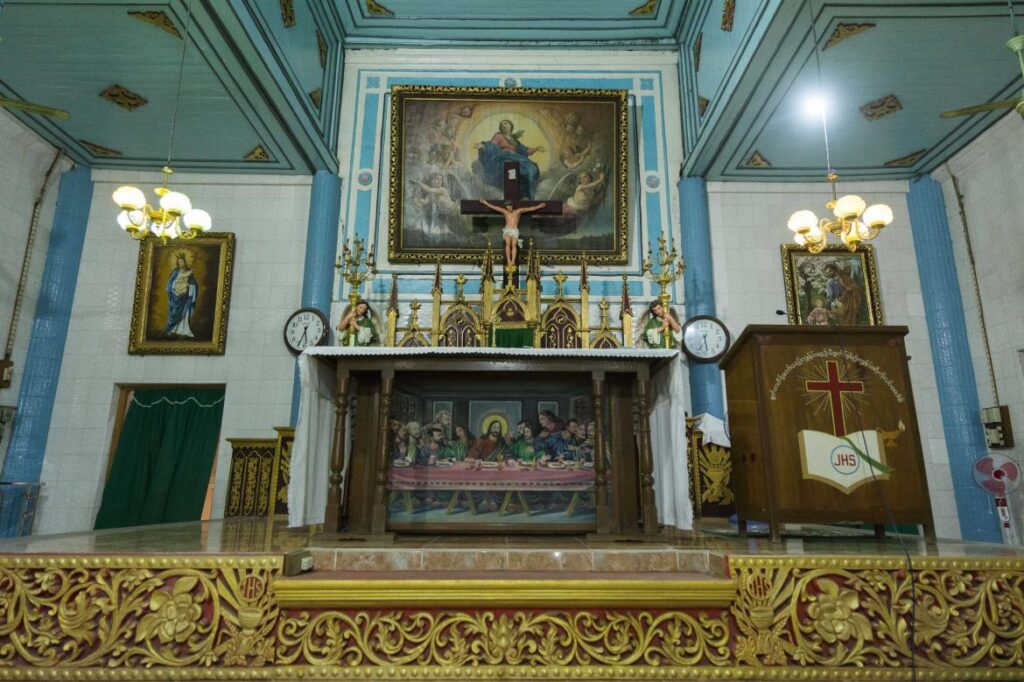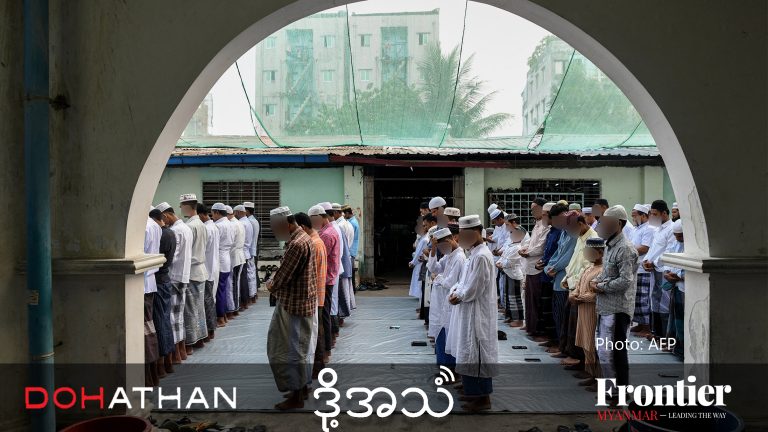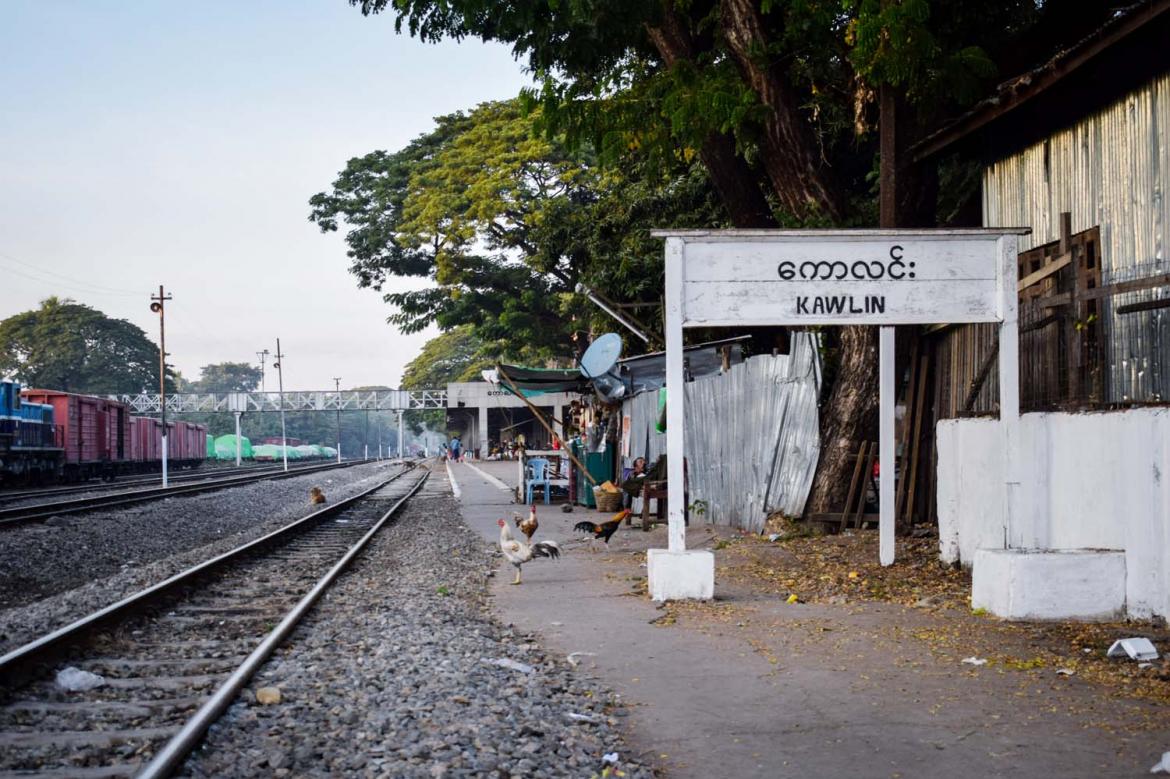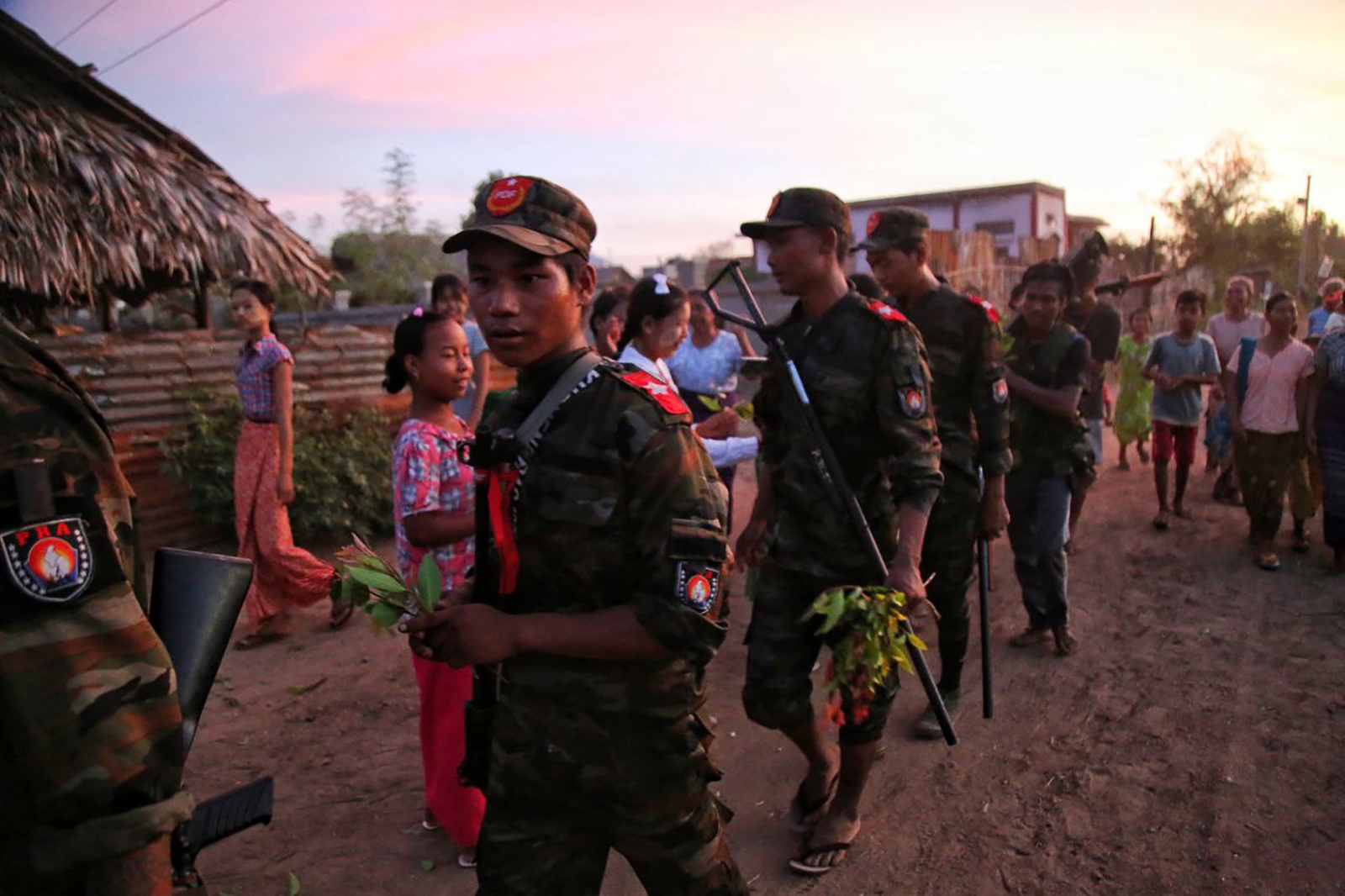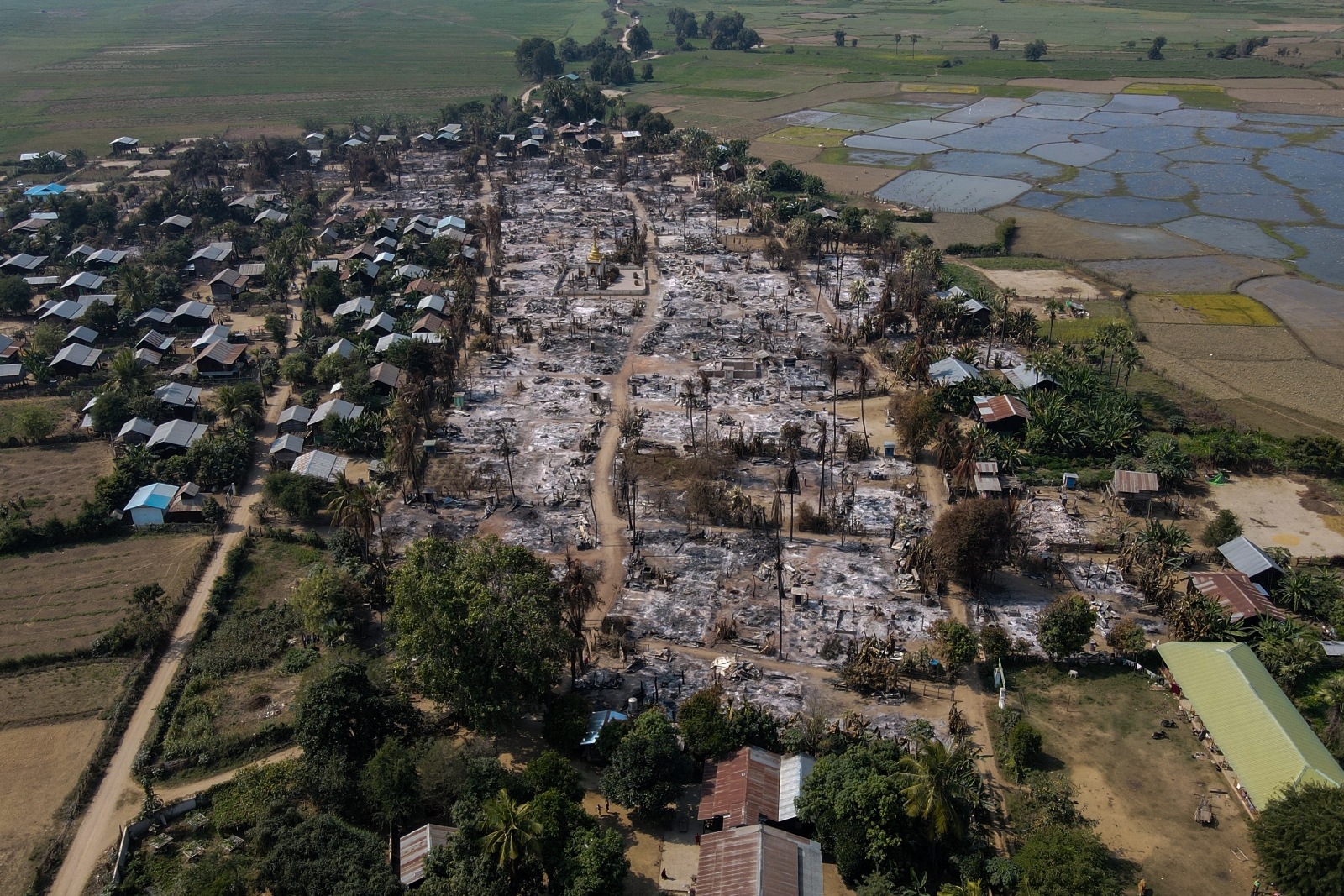As the military regime targets places of worship to break popular support for the resistance, Catholic communities caught up in the conflict are being denied the consolations of their religion.
By RACHEL MOON | FRONTIER
The 40 days of Lent are usually a time of quiet contemplation for Roman Catholic communities along the Mu River in Sagaing Region. But the traditional run-up to Easter Sunday, which this year falls on March 31, has instead been full of terror as the military raids villages and attacks places of worship in Ye-U, Taze and Khin-U townships.
U Htun Lwin*, a farmer in his fifties in Taze’s Shwe Kyar Tan village, used to go beyond the Catholic Church rules that prescribe abstaining from meat on Fridays and eating less on other specific days. Instead, he would fast every day besides Sundays. But he hasn’t been able to fast at all for the past three Lents due to military raids, leaving him feeling ashamed.
“We just don’t have enough energy to fast for God,” he explained, describing how villagers have to flee each time junta forces approach. “It’s difficult enough for us to worship, let alone fast,” he told Frontier by phone from a nearby village where he was sheltering.
While the region is part of the Bamar Buddhist heartland, it is also home to villages of people known as the Bayingyi, who are Catholics partly descended from Portuguese settlers in the 16th century. Some Bayingyi have joined the resistance against the 2021 coup, and the military has responded with brutal reprisals fuelled by racist nationalism.
Some 25 kilometres to the south of Shwe Kyar Tan is another Bayingyi settlement, Ye-U’s Chan Thar village, where the military torched the 129-year-old Church of Our Lady of Assumption in January last year. Chan Thar resident U Myo* said that now whenever Catholic festivals come around, the sight of the church’s blackened wooden pillars and shattered concrete walls “is like a burning stake against our hearts”.
When possible, the community still gathers on Sundays at a small, sheltered shrine for the Virgin Mary next to the ruined church, to pray for peace in their village and the whole country. But U Myo said, “I really miss the time when I’d worship peacefully in the church”.
Churches as well as Buddhist monasteries and mosques have been bombed from the air and torched by marauding soldiers in conflict zones across Myanmar. The United States-based Chin Association of Maryland said that as of December, the military had destroyed more than 220 churches of various denominations nationwide.
Christians make up about six percent of Myanmar’s mainly Buddhist population, according to the last census in 2014. Besides the Bayingyi of Sagaing, substantially larger Christian communities are found among ethnic groups in Chin, Kachin, Kayin and Kayah states.
Father George Nge Lay, a priest in the Saung Du Parish, which includes several village tracts in Kayah State’s Demoso Township, told Frontier that there had been 41 Catholic churches, all but 10 of which had been destroyed by airstrikes in the post-coup conflict.
“This is just the number in our parish. Other parishes in the state also lost their churches. We believe at least 100 Catholic churches have been destroyed in Kayah,” he said.
Members of the Catholic clergy in Myanmar told Frontier the military bombs churches because it suspects resistance forces are using them as hideouts. But at the same time, it wants to terrorise ordinary people in the hope they will stop supporting resistance groups.
A priest in the Archdiocese of Mandalay, which includes Mandalay Region and large areas of Sagaing and Magway regions, told Frontier that Archbishop Marco Tin Win had written to the military’s Northwestern Command in late 2022 calling for places of worship to be left in peace. Soon after, the military torched the church in Ye-U’s Chan Thar village.
“Our archbishop felt great sorrow. We all did. Churches are a place to pray for peace. Setting fire to them is an act against peace. We can’t understand why they’re destroying them, and why they don’t want peace,” he said, speaking on the condition of anonymity.


Chan Thar’s Assumption Church, pictured in 2017 (Frontier), and after it was razed by the military in January (supplied).
‘We have a duty’
Ye-U-based Father Henry* said he was one of seven priests serving six different churches in Ye-U, Taze and Khin-U townships, and that despite the constant risk of military raids, they were determined not to abandon their congregations.
“We’re not just acting out of duty. We have a real bond with our fellow believers, so we don’t want to leave them by taking refuge permanently in the more peaceful towns. We run away from war together, we eat together. We have a duty to take care of our people, including those of other faiths, as good shepherds. It’s the responsibility of priests to live and die together with the people,” he said.
But despite Pope Francis occasionally speaking out about Myanmar’s plight, the priests interviewed by Frontier felt they were on their own.
“I don’t want to send any more messages to the international community. They already know what’s happening but no one takes action against the junta for its war crimes. Even if I sent word, no one would listen,” said Father Nge Lay from Demoso Township.
“I just want to tell them to open their hearts, open their eyes and open their ears so that they can really feel what’s happening in Myanmar.”
Salai Mang Hre Lian, project manager of the Chin Human Rights Organization, told Frontier that more than 100 religious buildings of all faiths had been destroyed in Chin State, where nearly 90pc of the population is Christian. But even in many of the churches that remain, the military’s oppression has kept believers away.
“It used to be the religious custom for young people to stay at church on Saturday nights for volunteering and choir practice,” he said. “But when martial law was declared in Chin State, the military banned all religious activities and gatherings.”
But even in the large areas of the state now controlled by resistance groups, most residents don’t dare to gather in churches because of the constant danger of airstrikes.
“All religious assemblies know they can be a target at any time. The destruction of religious buildings has forced people to avoid large events. If they do occasionally gather, they’re very careful not to let the news get out,” he said.
Yet, even in areas of minimal conflict such as Ayeyarwady Region, Christian communities no longer feel safe.
Naw Teresa Khin*, a 58-year-old Catholic of Karen ethnicity in Ayeyarwady’s Danubyu Township, told Frontier that each February, local members of her faith used to celebrate a festival honouring the Virgin Mary with lots of almsgiving and a fair filled with stalls. Since the coup, they had just held low-key ceremonies at St Paul’s Church in Danubyu. However, that wasn’t enough to stop soldiers from the town’s Light Infantry Battalion 108 from barging into the church during evening Mass on February 10 this year.
“They ordered the priests to sit on the stage and ordered the men and women in the congregation to sit separately. We were in the act of worshipping,” she said. “The leaders of the church negotiated with them and were told that the church could not have lighting after 8pm.”
While the junta has imposed nightly curfews elsewhere in Myanmar, it has not done so in Danubyu, making the 8pm request arbitrary.
Teresa Khin said the soldiers eventually left after the church elders gave them some money, but the community felt they had no choice but to cancel the rest of the festival.
“I felt sad, and that it’s unfair,” she said. “They allow all the Buddhist festivals like the Kathina robe offering ceremony, with people moving around the wards with loudspeakers, so why can’t we even hold Mass in church peacefully?”

Cake with Min Aung Hlaing
Teresa Khin also expressed anger and dismay at Myanmar’s most senior Catholic, Cardinal Charles Maung Bo, who is of Bayingyi descent. Maung Bo, who has been Archbishop of Yangon since 2003 and was made a cardinal in 2015, met junta chief Senior General Min Aung Hlaing in December 2021. They were shown cutting a Christmas cake together at the cardinal’s official residence, in a picture that was posted across junta-controlled media.
“Maybe the cardinal thinks he has to maintain a close relationship with Min Aung Hlaing because he’s worried for the whole religious community,” she said, while pointing out that the military later attacked Maung Bo’s home village of Mon Hla in Sagaing’s Khin-U Township in November 2022, in a raid that reportedly destroyed hundreds of homes and killed three civilians.
“The junta showed no sympathy,” Teresa Khin said of this incident. “Instead, he should bravely request that the junta leader not bomb any Christian churches, Buddhist pagodas or hospitals. If he did, we could understand him meeting with Min Aung Hlaing.”
Father Dominic Htwe, a member of Spring Revolution Interfaith Network, an anti-junta group, also described Maung Bo as someone lacking courage who had made fellow Catholics feel helpless.
“The cardinal is the highest of all Catholics in Myanmar. We all rely on such a person. We want to see him protect us as a good father and shepherd, and stand up bravely for people of faith. Instead, he does the opposite,” he said.
But while he’s stopped short of condemning the junta, Catholics close to the cardinal point to his appeals against all violence and in favour of dialogue and the release of political prisoners. In a statement issued two days after the coup, he called on the military to treat the civilian population “with great dignity and peace”. “Let there be no violence against our dear people of Myanmar,” he said, addressing the military directly.
The priest from the Archdiocese of Mandalay urged people to withhold judgement.
“We can’t know what secret pressures there are at the top. That’s why we must be understanding, even though we don’t like the cardinal’s actions,” he said.
“The Catholic Church is one family living under one leader, like sheep with a shepherd. We accept it as God’s will. Disagreements will not separate us.”
*denotes the use of a pseudonym for security reasons


